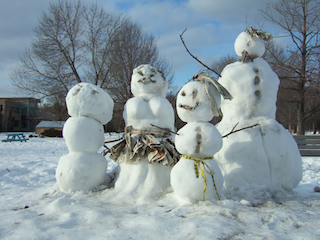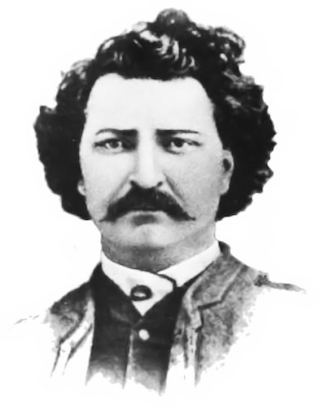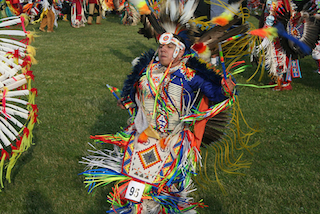World Traditions: Family Day

Image Source: Joe Howell, Flickr
February 20th, 2017
In Canada, Family Day is observed in the provinces of Alberta, Saskatchewan, Manitoba, Ontario, and in British Columbia. It is a relatively recent holiday. Family Day is meant to give families time to spend together as well as providing a day off between New Years Day and Good Friday. On this day, common activities are skating, tobogganing, playing hockey, going to winter festivals, and many other typical Canadian winter activities.
Family Day was first celebrated in 1990 in Alberta. The second province, Saskatchewan, picked up the tradition in 2007, followed by Ontario in 2008, and British Columbia most recently, in 2013. Although February holidays are a relatively recent occasion, they are sure to become a beloved Canadian tradition for a new generation of Canadians.
Three other provinces and the Yukon territory observe separate holidays in the month of February.
Manitoba: Louis Riel Day

Louis Riel, 1844-1885. Image Source: Wikipedia
In Manitoba, the third Monday of February marks Louis Riel Day.
Louis Riel was a Métis, born October 1844 in Saint-Boniface, Red River Settlement, which is today Winnipeg, Manitoba. At the time of his birth, not only was Manitoba was not yet a province, but Canada would not become a country for another 23 years.
Métis have a long history in Canada, dating back to as early as the 1600s. Marriages between French settlers and Native Canadian people and the children borne from them incorporated parts of European and Native cultures, creating a culture uniquely their own, known as Métis.
Canada’s early government consisted of English-speaking European settlers. As Canada became a country, Métis people were not consulted on whether or not they wanted to be part of it. Métis people wanted their voices heard in the decision-making process. Louis Riel led a resistance against the government of Canada. The Canadian government eventually recognized Riel’s government. In 1870 Manitoba became Canada’s fifth province.
In 1885, Riel again led a resistance against government encroachment into Métis territory. The federal government sent in 500 soldiers and fighting against the Métis lasted two months. Riel eventually surrendered and a formal charge of treason was laid against him. Although his lawyers wanted to portray him as insane (he had earlier spent time in a mad house) Riel didn’t want this portrayal to discredit the legitimate grievances experienced by the Métis people. Riel gave an eloquent speech at the end of his trial, which proved his sanity and confirmed his guilt, assuring that he would hang.
He was considered a hero to many in Western Canada but most of English-speaking Canada considered him a traitor. Riel was executed November 16th, 1885 by the Canadian government. The Métis Nation also recognize November 16th as Louis Riel Day.
Nova Scotia Nova Scotia Heritage Day

A dancer in the Mi'kmaq Celebration. Image Source: Flickr
The third Monday in February marks Nova Scotia Heritage Day. This year, Nova Scotia Heritage Day will recognize the Mi’kmaq culture, the first people of Canada’s Maritime Provinces and the Gaspé Peninsula of Quebec. They lived in the region for many thousand years before European contact. An old legend taught them that blue-eyed people would one day come and disrupt their lives.
Nova Scotia is also known for its Acadian people, who descend from French colonists. Acadians lived in Acadia – what is now Canada’s Eastern Maritime provinces. They soon developed their own dialect. Beginning in 1710, the British attempted to gain control of the region, leading to years of fighting between the two groups.
Nova Scotia is also the historical home of many of the first Black Canadians. The first to arrive was Mathieu da Costa, who arrived with the exploring party of Samuel de Champlain as early as 1603. Others arrived through various means; as slaves, escaped slaves, Black Loyalists, or for other reasons. Many Black Nova Scotians created a town known as Africville, on the edge of Halifax Harbour. It lasted for over a century until it was displaced by industrial expansion in the 1960s.
Prince Edward Island Islander Day
Since 2009, Islander Day has been held the third Friday of February in Prince Edward Island. Many have school and work off on this day. People enjoy spending time with friends and community. As in other parts of Canada, Prince Edward Islanders often participate in well-known Canadian outdoor activities including skating, skiing, sleigh rides, carnivals, and numerous other activities.
Yukon Heritage Day

Image Source: Wikipedia Commons
People in the Yukon Territory celebrate Yukon Heritage Day usually on the last Friday of February. It has taken place since 1976 and normally coincides with the Yukon Sourdough Rendezvous. The festival has an overall theme of the 1890s, celebrating the Klondike Gold Rush, and all things Yukon. Events include pancake breakfast, axe throwing, dogsledding, chainsaw chucking and the crowing of the festival Queen.


